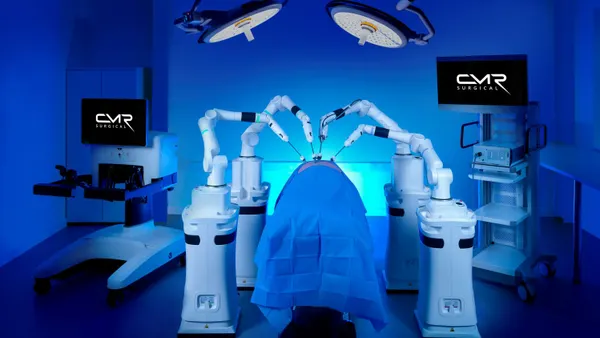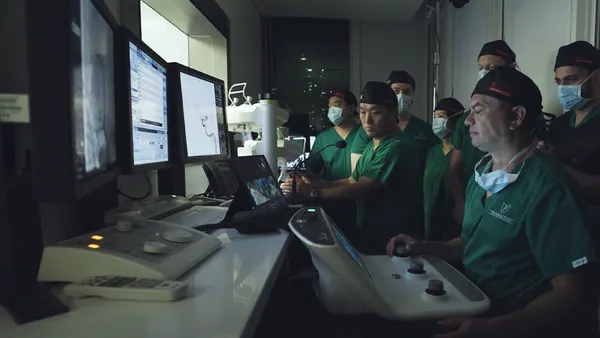The healthcare sector's move toward value-based care impacts companies that develop, sell and distribute medical devices. Like the healthcare organizations themselves, medical device manufacturers have to ensure their products deliver meaningful benefits relative to price. At the same time, they must streamline operations, including inventory management, to control costs.
Inventory is a major cost center for device companies, which means it's also a potential cost-saving center. However, the outdated, inefficient management systems used by some of these companies have the opposite effect.
"Optimizing inventory levels is extremely important for medical device companies," says Giovanni Viznay, senior inventory analyst at Getinge, a global medical device supplier. "Excess inventory is working capital that's just sitting in the field or on the shelves."
Cloud-based software solutions allow medical device manufacturers and suppliers to reduce inefficiencies, both in the warehouse and out in the field. Automating certain processes leads to full inventory visibility and greater accuracy, which helps reduce overstock and ensures all expired products are removed from hospital shelves. Cloud-based field inventory solutions integrate with ERP software to provide sales representatives the information they need in real time.
The result: improved shipping accuracy, reduced operational costs, an uptick in sales and more efficient communication between distribution centers, sales teams and healthcare organizations. Most importantly, patients receive the quality care they deserve, because everything needed to provide that care is always within reach.
What's in the trunk?
In an industry driven by technology, it's surprising that some companies still rely on manual counts and spreadsheets. But they do.
Maintaining accurate inventory counts becomes even more challenging in the field. DSI Senior Account Executive Michael Foster says sales reps often hold inventory in unconventional places like their vehicle or home. With no other mechanism available, they often count inventory manually. Trunk stock visibility is either inaccurate or nonexistent. They also rely on customers to provide consignment inventory counts—not ideal from a customer service or accuracy perspective.
"Having accurate numbers of both consignment and trunk stock creates a positive customer experience," says Viznay. "They want to collaborate with companies that have accurate data. It's important for the customers, as well as for the patients using these products."
Sales reps depend on mobile devices out in the field to communicate with customers and to access product information. But because ERP inventory management—even with warehouse management systems (WMS) modules—usually don't support mobile, the people interacting directly with customers lack critical inventory data.
The value of automating processes
To improve accuracy and visibility, as well as to control costs, the medical device industry is moving toward lean industry models. By analyzing the supply chain, many of these companies have found new ways to use technology.
Getinge uses a combination of proprietary inventory systems and third-party software in its distribution centers. "We no longer use paper," says Viznay. "Everything is uploaded into the SAP. Regional managers and sales reps can review the accounts and address discrepancies immediately."
Transforming the field
When using mobile field inventory solutions, medical device manufacturers and their field reps know exactly what they have at all times. "We send reps a daily total of what they have on hand and the dollar valuation, so they know the value of their inventory every day," says Viznay. "Viewing those numbers allows them to be very conscious when ordering goods."
Sales reps not only know what they have on hand, but they also know what their colleagues have as well. "A rep can see if a coworker has a spare part they need," says Viznay. "They can perform an internal transfer, which eliminates the downtime and expenses related to picking, packing and shipping. Giving them that information has been a real eye-opener that, at the end of the day, translates to customer satisfaction."
Viznay says Getinge provides inventory information to sales reps in whatever format they prefer, whether that's via an app or Excel spreadsheet. DSI Regional Vice President of Sales Brent DiBartolo encourages practices that promote compliance. "The first step to maintaining accurate trunk stock inventory is first understanding what trunk stock exists," he says. "The second step is ensuring the end users are going to be compliant with what is asked of them. That means focusing on ease of use and identifying potential benefits for the reps, such as creating incentive plans for reps based on inventory accuracy."
Cloud on the horizon
Traditional ERP warehouse management systems don't do a good job of tracking inventory outside the warehouse. Cloud-based systems not only ensure more accurate counts, but accurate counts right now.
A cloud-based solution with mobile applications and certified ERP connectors can fill the gap left by traditional ERP warehouse management systems. That means tracking inventory in the warehouse, in the trunks of cars and in surgery centers. Cloud-based mobile apps allow for centralized management and speedy transfer between the entities, which eliminates any delays when waiting for an order to fill. "The ability to transfer inventory between reps, doctors or hospitals in a single interface is very powerful—especially during an emergency," says DiBartolo.
Maintaining regulatory compliance
Medical devices follow a complicated path from manufacturer to patient. To maintain regulatory compliance, companies need to track and validate each step. They also have to keep accurate records of adverse events and potentially hazardous products.
Cloud-based, mobile inventory management solutions ensure medical device companies maintain accurate records of all products, as well as potential hazards, adverse events and product expiration dates. "The ability to track lot numbers and serialization is key to satisfying internal quality regulations and federal regulations," says Foster. "Traceability is a must."
One of DSI's customers, a leading medical supplier, not only received full visibility into serial number tracking and lot-controlled products when it implemented an automated, cloud-based storage and retrieval system, but also increased sales volume by 30 percent. Integrating with its existing ERP, the medical device supplier's cloud-based system allows for high-speed receiving, putaway and picking.
"Cloud-based platforms help sales reps spend less time in hospital warehouses and more time with customers," says DiBartolo. "They also allow for easier reconciliation at month-end or quarter-end so there are fewer discrepancies. Once these efficiencies take root, companies can deliver products at a lower overall cost."
The medical device industry uses the latest technology to develop safer and more effective products. By bringing some of that technology into the warehouse and out in the field, manufacturers and suppliers can reduce operational costs and stay competitive in a value-based environment.










